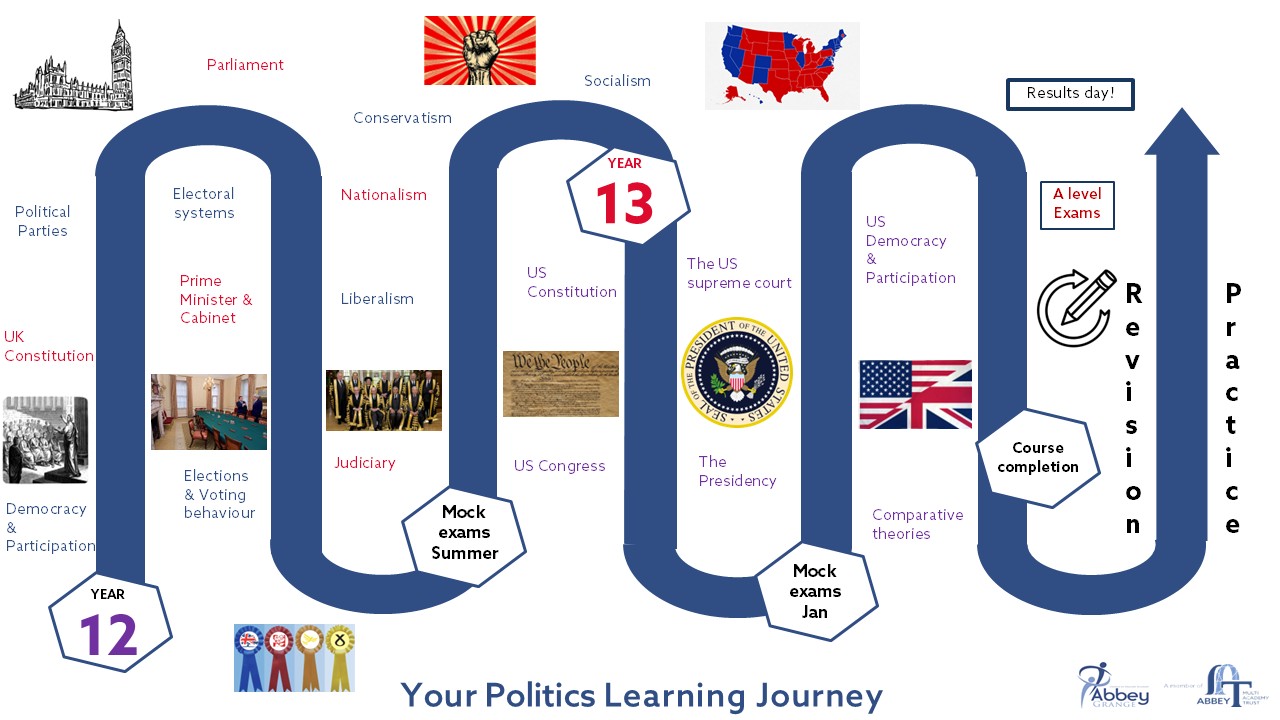
Our Politics curriculum empowers every student to engage critically with the political world around them. We aim to cultivate thoughtful, informed and active citizens who flourish through a rigorous and enriching exploration of political systems, ideas and debates. Through high-quality teaching, open discussion and the development of independent thinking, we nurture a culture of curiosity, confidence, and ambition—encouraging students to challenge assumptions, consider diverse perspectives, and aspire to shape society for the better.
Head of Department – Miss. J. Anderson
janderson@abbeygrangeacademy.co.uk

Students will follow the Edexcel Pearson exam board for A Level and cover the topics of:
UK Politics including democracy and political parties, electoral systems, voting behaviour and the media. Three core political beliefs will also be covered: Liberalism, Conservatism and Socialism; In UK Government, students look at the constitution, parliament, the role of the prime minister and the Executive, as well as the relationships between the different branches, including the Supreme Court. We will also discuss Nationalism as an ideology; There will also be comparisons between US government and politics and UK government and politics.
The Politics A Level curriculum allows students to flourish and embrace life in all its fullness.
Students will be aspirational in their use of language and be able to ‘speak like a specialist’ in Politics.
Students will be able to put forward their own beliefs about Democracy and the UK’s ability to hold its executive to account.
Students will make progress by ensuring their political debates include knowledge, analysis and evaluation.
Students will be able to show leadership by reflecting on learning and attending external community service or further studies with different political bodies.
Students will have opportunities to work in groups and refine their oracy skills through presentations and debates. They will encounter a diverse range of topics which will allow them to consider Politics from different points of view, ideologies and political systems.
Students will reflect on the moral and spiritual values that underpin political systems, ideologies and institutions. They will consider how democracy, justice, leadership and freedom connect to ideas of human dignity, conscience and the common good. By exploring diverse ideologies, students will examine how different beliefs about society and identity relate to spiritual principles of community, care and responsibility. Opportunities for respectful debate, empathy and reflection will help students develop an awareness of their own values and the impact of politics on communities.
Students will be assessed by sitting three exam papers at the end of Year 13:
Paper 1 - Unit 9PL01 - UK Politics and Core Political Ideas - Written examination: 2 hours (33% (1/3) of the qualification)
Paper 2 - Unit 9PL02 - UK Government and Non-core Political Ideas - Written examination: 2 hours (33% (1/3) of the qualification)
Paper 3 - Unit 9PL03A - Comparative Politics (USA) - Written examination: 2 hours (33% (1/3) of the qualification)
In addition to this, there will be various assessments across the two-year course where students will have the opportunity to practice exam skills in timed conditions in preparation for their external exams.
Studying Politics develops students’ thirst for the subject by empowering every student to engage critically with the political world around them. This will cultivate thoughtful, informed and active citizens who flourish through a rigorous and enriching exploration of political systems, ideas and debates. A culture of curiosity, confidence, and ambition are nurtured, and students are encouraged to challenge assumptions, consider diverse perspectives, and aspire to shape society for the better. A knowledge of politics and the skill to analyse and evaluate ideas are skills that are developed in Politics so that students will question, interpret and make judgements about different areas of politics. Students will develop transferable skills that could support careers in government, law, journalism or public policy, as well as the study of Politics, History, Law, Media or Political Science at University.